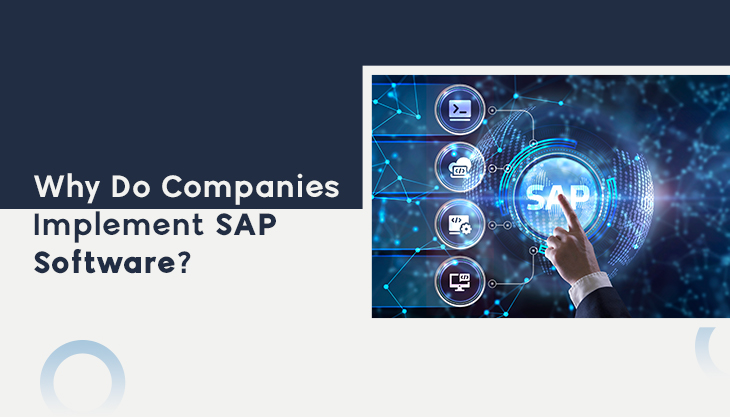As businesses are digitally transforming themselves with Enterprise Resource Planning (ERP) solutions, there is a rise in SAP Software use. Systems, Applications & Products in Data Processing (SAP) can be used no matter the size or industry, enterprises can reap the benefits of the software.
Why Do Companies Implement SAP Software?
SAP is recognized as a global leader, providing solutions that help transform businesses in a technology-driven world. With SAP, you’re sure to find solutions tailored specifically for your enterprise, no matter how large or small. Eighty percent of SAP’s clients are small to midsize companies.
What is SAP Software?
SAP software was developed by one of the largest software companies globally. Both the company and software share the same name, SAP. Like any other ERP system, SAP has different modules designed to streamline business processes within any department at the company, connecting the workers and their ideas.
The SAP modules include human resources, finance, and sales, to name a few. Depending on the business needs, you can purchase any module and would be hard-pressed to find one that does not fit those needs. SAP can manage practically all departments at any organization, revolutionizing how business is operated.
Sap Is Compatible with Any Business
Regardless of the number of employees in the company in the growing phases, SAP has a comprehensive portfolio of leading cloud-based ERP solutions. The tools to fit the needs can also be used. Furthermore, one business can rely on SAP’s 24/7 support teams.
Where Is the SAP Used?
Any Software Development Company that needs to work on the management of business processes can use SAP. It facilitates effective data processing and information flow across organizations. The companies continue to innovate, with software like SAP leveraging data in memory while supporting advanced technologies. These technologies are Artificial Intelligence (AI) and machine learning.
SAP has more than 230 million cloud users, more than 100 solutions covering all business functions, and any provider's most extensive cloud portfolio.
Understanding and Learning SAP
SAP has an extensive portfolio of learning programs designed for several roles, including IT administrators, project teams, key users and end-users. The organization must acquire the necessary skills to leverage new, innovative technologies to continue moving forward in the digital transformation.
Advantages of SAP
The reasons behind companies implementing SAP are:
1. Innovative technology
With over 40 years of experience in ERP, SAP is to speed up all the latest innovations. It ensures that your business is equipped with the right tools for the future. SAP provides future-proof Cloud ERP solutions that will power the next generation of business.
Using its advanced capabilities, SAP can boost the organization’s efficiency and productivity by automating repetitive tasks and making better use of your time, money and resources.
2. Flexible and secure
Today, companies are seeking flexibility. SAP allows the business to customize processes, use the public or private cloud, or pay only for the client's needs. Furthermore, when it comes to keeping the company safe, it's essential to have a team of experts on your side that is constantly thinking ahead.
SAP ensures that the client's data is secure, protecting the business from hackers. Moreover, SAP has the expertise to significantly reduce the number of threats your business faces every day and is built on one of the most advanced infrastructures in the world.
3. Inventory management
SAP enhances inventory management via an advanced warehouse and bin location tracking system that offers better maintenance and management of stock and warehouse data. It can also track and document stock levels, transfers between warehouses, price lists, and pre-defined pricing agreements.
4. Improved lot traceability
SAP Business One optimises inventory to ensure that item levels are always favourable and items are appropriately rotated. The system also includes product expiration date analysis to trace products and components back to the source.
5. Robust dashboards
With SAP, users can create custom dashboards to get a full view of the business. The solution also includes flexible queries and analysis features, allowing users to dive deeper into their data and gain further insights. SAP software can integrate your business, work leaner, improve customer service, and make better-informed business decisions.
6. Data centralisation
SAP puts the data from different processes and business functions in a centralised location. This makes sharing data and information across business units and departments easier. Departments such as sales, inventory, finance, production and human resources can access data from different departments and efficiently communicate the needs of their department.
This also helps in reducing errors and delays in communication and improves overall efficiency. Any business's success relies on effective communication and data exchange among all departments, and SAP, as an enterprise resource planning software, enables this communication and information exchange.
7. Automation
SAP enables the automation of workflows and makes processes streamlined. Data from processes like account management, order management and vendor management flows automatically according to the approval and rejection guidelines defined in the system.
This helps organisations become more efficient as the employees can focus on more productive tasks and the ERP system handles the mundane ones.
8. Accessibility
It is possible to deploy SAP through the cloud or on-premise. This makes SAP ERP highly versatile and accessible. SAP also offers mobile-based applications for many of its features and applications. It supports all the major operating systems and devices like Windows, Linux, Android, iPhones and Mac.
This means that a user can access the ERP from anywhere. With the best-in-class security features provided by SAP, any organisation's confidential data is always secure, even when accessing it through mobile applications.
9. Globalisation
SAP provides support for a variety of different geographical locations. As an enterprise tool, SAP supports all the major currencies globally, making it useful for companies with international operations.
10. Visualisation
The reports and dashboards functionality offered by SAP lets you view all the essential data pointers in an easy-to-understand format in real-time. Graphs and charts are easier to understand and go through than large data files. This lets you decide on the next course of action swiftly and makes understanding the processes and related issues accessible.
11. Brings revenue growth
The features offered by SAP make processes more efficient, free up the employees to work on essential tasks and provide a holistic view of the operations to assess issues more efficiently. This increase in efficiency leads to the overall growth of revenue and profits for an organisation.
The Most Widely Used SAP Modules
1. SAP Financial Accounting (FI)
As the term suggests, the SAP FI module manages financial transactions within enterprises. This financial accounting module helps employees manage data involved in any financial and business transactions in a unified system. This module functions very well for reporting requirements.
The SAP FI module is very flexible and functions well in any economic situation. Be it a smaller organization or a larger organization. SAP implementation helps in consolidating data for diverse business transactions and legal requirements. The Financial Accounting module allows one to get the real-time financial position of an enterprise in the market.
2. SAP Controlling (CO)
SAP CO module is another necessary SAP module offered to enterprises. This controlling module supports the process works of planning, reporting, and monitoring operations of businesses. It involves methods to view and organize costs required for financial reporting.
The controlling module enables one to plan, track, perform and report costs. Controlling includes managing and configuring master data that covers cost elements, cost centres, profit centres, internal orders, and functional areas.
3. SAP Sales and Distribution (SD)
SAP SD modules manage all transactions ranging from inquiries, proposals, quotations, pricing, and more. The sales and distribution module helps greatly in inventory control and management.
SAP SD module consists of master data, system configuration, and transactions. Some of the sub-components of the SAP SD module are master data, sales support, sales, shipping and transportation, billing, credit management, sales information system, etc.
4. SAP Production Planning (PP)
SAP PP module is another important module that includes software designed specifically for production planning and management. This module also consists of master data, system configuration, and transactions to accomplish the plan procedure for production.
SAP PP module collaborates with master data, sales and operations planning, distribution resource planning, material requirements planning, Kanban, product cost planning, and so on while working towards production management in enterprises.
5. SAP Materials Management (MM)
As the term suggests, the SAP MM module manages materials required, processed, and produced in enterprises. Different types of procurement processes are collected with this system. Some of the popular sub-components in the SAP MM module are vendor master data, consumption-based planning, purchasing, inventory management, invoice verification, etc.
6. SAP Quality Management (QM)
SAP QM module helps manage quality in productions across processes in an organization. This quality management module allows an organization to accelerate their business by adopting a structured and functional way of working quality in different methods. SAP QM module collaborates in procurement and sales, production, planning, inspection, notification, control, audit management, etc.
7. SAP Human Capital Management (HCM)
SAP HCM module enhances the work process and data management within the HR department of enterprises. Right from hiring a person to evaluating one’s performance, managing promotions, compensations, handling payroll, and other related activities of an HR are processed using this module.
Managing the details and task flow of the most critical resource, i.e., human resources, is controlled using this SAP ERP HCM module. These are some of the essential SAP deployment modules that develop software for efficient work in enterprises.

















Post Comments